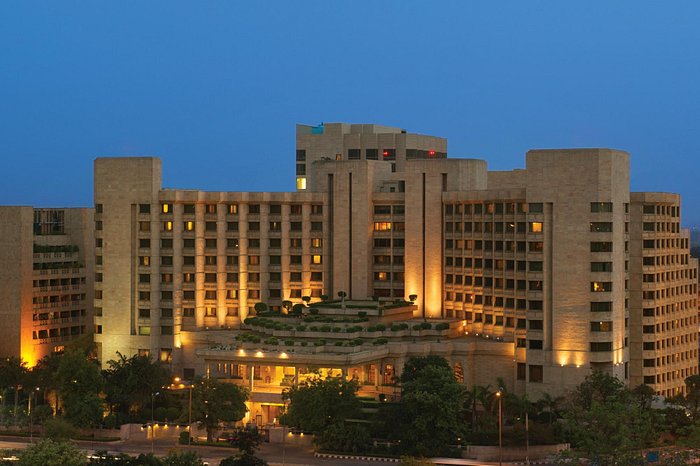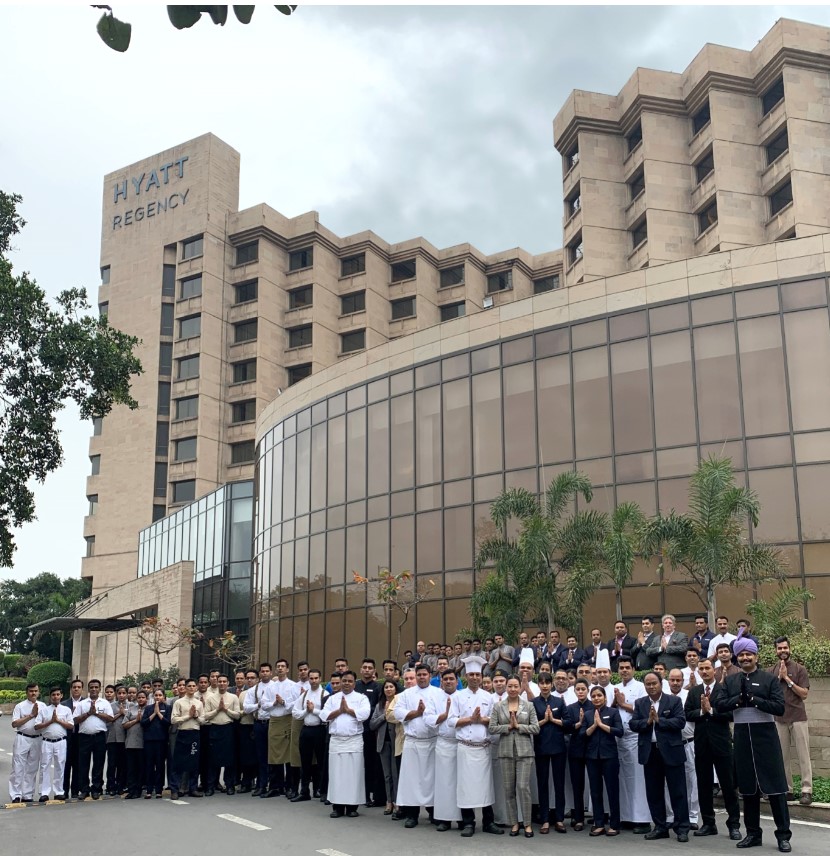MS. Please tell us about your role at Hyatt Hotels and what are your key responsibilities here?
Shrikant Wakharkar. I am the Area Vice President of Hyatt Hotels – North and have been appointed as the General Manager of Hyatt Regency Delhi since March 2022. I have a total of 11 hotels in my portfolio, including 5 properties from the south – Park Hyatt Chennai, Park Hyatt Hyderabad as well as 3 Hyatt properties in Kerala. My primary role is to oversee all hotel operations, implement tactical strategies to boost growth and drive innovation across all the properties with the focus being on maximising guest satisfaction by ensuring that the hotels are running efficiently. Additionally, I lead all aspects of business planning to ensure profitability of each property; provide guidance, mentorship, and adequate training to the General Managers of all properties under my supervision and to ascertain full compliance to hotel protocols, SOPs, policies and procedures.
MS. How did you get into this industry? How have you seen the industry evolving over these years from the time when you started in this industry?
Shrikant Wakharkar. I graduated from the Institute of Hotel Management in Bhubaneshwar, and it has been more than thirty years since that I’ve
been a part of this industry. Things have really changed over the past three decades. Advancement of technology has revolutionised hospitality industry. With the use of technology, things have become a lot easier, which were not so about 30 years back. An important and a welcoming change has been the introduction of various sub-brands under the umbrella of highly reputed brands. For example, Hyatt’s initial hotels were Grand Hyatt and Hyatt Regency, which catered to only a certain segment of the population. Now, we have Hyatt Centric, Hyatt Place, Hyatt House and more. These sub-brands come with their own identities and pillars, and they resonate more with a certain section of society and that section embraces these brands more easily. As a result, hotels today are no longer about food and accommodations only. They have become social hubs where people like to gather and be seen.

MS. How has your property performed post-pandemic? What are the current statistics. What novelties shall we be expecting for the upcoming year?
Shrikant Wakharkar. Post pandemic, most of the properties under my portfolio matched up to the 2019 numbers, at least in the first half of the year. As we entered in the second half, we witnessed massive improvement and we outperformed the 2019 numbers of the corresponding months. This trend, at that precarious time, was highly encouraging and it made us more optimistic. Going forward, we are very bullish about the upcoming year. New Delhi will be hosting the G20 summit and Shanghai Cooperation Organisation Conference in 2023 and because of that the Delhi-NCR region has already seen a lot of movement from various countries towards that end. Many countries have started sending their delegates to check out arrangements and scout for collaborations. So, 2023 promises to be the best year in recent times.
MS. You have elaborate & diverse experience in the Hospitality industry. Please tell us about your professional journey so far, including the challenges you’ve faced and the milestones you’ve reached over the years.
Shrikant Wakharkar. I started out from a food and beverage background and have worked in restaurants, banquets, in-room dining etc. In the past three decades, I have held key leadership positions in reputed hospitality brands like Marriot Hotels, Taj, Intercontinental and Starwood. I have nearly 14 years of experience as a General Manager. Before joining here, I was the General Manager at Grand Hyatt Kochi Bolgatty. This is my second innings at Hyatt Regency Delhi; I was a part of the flagship property as Assistant Director, Food and Beverage, in 1999. Some major challenges that I faced along my professional journey included dealing with volatile unions in a couple of hotels and convincing owners to re-invest in their assets after a period of 7-8 years when the property starts showing signs of ageing.
MS. Being in this position at a time when the Indian hospitality industry is in a strong recovery mode, what would be your priorities?
Shrikant Wakharkar. Our priority, right now, is to primarily focus on the bottom line. In order to achieve a healthy Gross Operating Profit, we are concentrating on room yields, higher EDRs and higher Average Per Cover to boost and maximise on restaurants and events revenue. Another goal is to arrest attrition of key talent and provide adequate skill training to well-equip the staff at all levels. We are witnessing a boom like never before, especially in the events space. The next two years are very crucial as they will set the tone for the rest of the decade. Overall, trends and numbers have indicated a very healthy period for this industry.
MS. What change would you like to see in the hospitality industry, and why?
Shrikant Wakharkar. The hospitality industry is a big contributor to the government coffers. With this in mind, I would expect the concerned authorities to view this sector with the lens that it deserves. There is a pressing need for parity of laws and framework for this sector across the country. The government must look into making policy changes that are industry-friendly and should also look at doing away with archaic policies like excise. This much needed reform would further boost the growth of the sector and facilitate higher employment.
MS. In what ways has Hyatt been instrumental in making the guest’s experiences memorable?
Shrikant Wakharkar. We, at Hyatt, are guided by our purpose of care – “To care for people so they can be their best.” We really believe in advancing personalised care and service to all our guests. Personalisation has been the core of all our operations so that we can help create memorable
experiences for all our guests. Additionally, our food and beverage reputation, both in restaurants and banquets, enables us to deliver on quality and helps us to maximise guest satisfaction. We have also recently re-launched our dining loyalty program – Hyatt Dining Club. The program has been very well received across the country.
MS. What are your thoughts about MICE and what key trends do you foresee in the hotel industry in regard to MICE business in particular?
Shrikant Wakharkar. I want to take a two-pronged approach to this question. Let’s talk about weddings first – since foreign travel was largely restricted over the last couple of years due to COVID-19, we witnessed an upsurge in Indian weddings being held in domestic destinations. Destinations that were hitherto unknown have become front runners for hosting big fat Indian weddings. Take for example the Grand Hyatt hotel in Kochi – Kerala was never a wedding destination for large-format weddings. This one hotel, however, has put Kerala on the wedding destination map of the country. The recent times have exposed the potential in this country for hosting large scale weddings, which remained largely untapped till now. Going forward, our country is going to become a formidable wedding destination and I foresee lesser weddings being held in publicly presumed exotic destinations like Phuket, Bali etc. Talking from the point of view of conventions now, we have already seen a robust growth in the domestic convention segment. As far as international conventions are concerned, we have started receiving leads for some of our properties for 2024 considering that these large format conventions require 16-20 months of planning. Since skies have pretty much opened now, we foresee that 2024 will be the year that India will witness many such conventions. G20 Summit, to be held in Delhi in 2023, will set the ball rolling for large-scale conventions in the country.
MS. The MICE industry, like the rest of the world, has seen a lot of change in a short period of time. How is your venue poised to capture the pulse of MICE Industry?
Shrikant Wakharkar. Hyatt Regency Delhi is nestled in the heart of Delhi-NCR region. It is situated close to diplomatic enclaves, corporate hubs, and major networks of transportation. It is in close proximity to 4 golf courses in Delhi, premier malls and many cultural and heritage sites. The easy accessibility to and from the hotel makes it a perfect venue for hosting MICE events. The hotel provides nearly 32,050 sq ft of venue spaces that are equipped to host all kinds of social events. The Mansion at Hyatt Regency Delhi is home to multiple unique event spaces that can be converted and can be utilized to host large-scale gatherings for varied purposes. The Oval Room is a one-of-a-kind venue space within The Mansion that can be converted to host launches, summits, conclaves etc. We have recently held a Google Pixel and a car launch event here. The Oval Room is supported by Regency Ballroom, another addition to our banqueting space. Our hotel features 507 contemporary rooms, and such a large inventory allows us to host a large number of guests thereby adding to the hotel’s value as an ideal venue for such gatherings. Hyatt Regency Delhi has also set a benchmark in fine dining and our 4 specialty cuisine restaurants, a European bakery, a traditionally designed bar and an all-day dining outlet deliver on quality food and beverages for all events.
MS. In your opinion, what does the MICE industry need to improve on and what are some challenges surrounding this sector?
Shrikant Wakharkar. Despite India being such a vast country, we have very few destinations which can accommodate large format international conventions. Delhi, Mumbai, and Goa are the most wanted destinations for such large-scale events and that’s where the list ends. We really need to take a look into developing destinations where huge conventions and gatherings can take place. A big challenge that MICE industry faces today is lack of easy accessibility to locations that are equipped to host large scale events. For example, there are very few flights to Kochi from Delhi and Mumbai which restricts Grand Hyatt Kochi from becoming a sought-after option for such gatherings.
MS. Hotels in many destinations have been facing staffing challenges. What has been your approach to selecting, nurturing and motivating talent?
Shrikant Wakharkar. Based on Hyatt’s fundamental purpose of care, we have instituted a very robust system in place for training and retaining our staff. For us, the most important facet is training and upskilling the staff so that they are well-equipped to deal with all kinds of hurdles and can further provide the best possible care to all our guests. Another way we nurture and motivate key talent here is by giving them adequate recognition. We at Hyatt, understand that recognition is a critical aspect when it comes to people leaving an organisation and that is why we have a comprehensive recognition program in place called Hyatt Stars in which staff at all levels are recognised and suitably rewarded. This has helped us control attrition to a large extent.
MS. What is your perspective on the role of sustainability in our industry? What practices can be adopted by the industry at large to promote the cause of sustainability?
Shrikant Wakharkar. It is Hyatt’s consistent effort to implement initiatives that are eco-friendly and promote sustainability. At Hyatt Regency Delhi, we have taken a host of reforms to promote a better environment like – boycotting the use of single-use plastics across the hotel. We have our own in-house water bottling plant where we manufacture our own bottles for water instead of plastic bottle. This advanced water plant with UV and Micron Filters, guarantees pure and bacteria-free water for consumption. In a bid to propagate and encourage a sustainable lifestyle, we had also adopted a green transport technology measure and have set up 4 electric vehicle charging stations within the hotel premises. Additionally, we use LED lights across the hotel, use recycled water for cooling tower and horticulture along with having a solar water heating system, smart building management and energy system.

MS. What is your leadership style? What according to you are your strong points?
Shrikant Wakharkar. I am a people’s person first and foremost and our industry is all about people. I firmly believe in nurturing and cultivating networks and relationships and since the beginning, have adopted a people-centric leadership style that allows me to foster meaningful relationships. I believe a lot can be done if we have a strong relationship with colleagues, guests, customers, travel trade, vendors, media partners etc.
MS. We have learned that you are also a health enthusiast, who starts each day with 5 km of jogging. If this is true, would you mind sharing: how do you balance work and life? We would like to know, what keeps you busy when you are away from work?
Shrikant Wakharkar. Yes, I am a runner and I’ve even run a few marathons. Running in the morning helps me gear up for the day and I consider it as a form of meditation. When I am away from work, my family and my dog keep me busy. I also spend a lot of time reading and listening to music. I strongly believe in a good work-life balance and feel that it is necessary to ensure best physical and mental health of individuals.
MS. Would you like to share any message with the industry?
Shrikant Wakharkar. Our industry is on the cusp of a revolution. We are about to embark on our golden period and the hospitality sector in India as a whole is poised for really big things in the future. Since international travel has resumed, corporate travel has also gained momentum. This has led to an increase in MICE activities and has further augmented the revenues. The sudden increase in demand from business travellers and leisure tourists has also resulted in an increase in room revenues. A lot of events are being planned or are already being held in many destinations across the country which has resulted in an uptick in occupancy levels similar to pre-COVID times. Things are bound to only move upwards from here for India’s hospitality sector.















